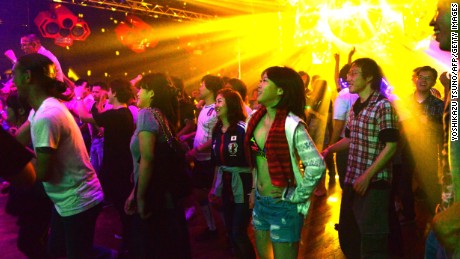Japan shakes off 67-year ban on dancing after midnight
On a recent Friday night, a small band of street performers breaks into an impromptu hip hop show near Shibuya crossing, one of the world's busiest intersections. A crowd quickly gathers, many begin tapping their toes, shaking their hips, and waving their arms to the beat. This kind of dancing in the streets is permitted in a vibrant, youthful place like Shibuya. Yet, just a few minutes walk down the street, behind a nondescript glass entrance and down a flight of stairs, that same kind of dancing could get you thrown in jail. The reason? It's happening in a club. SEE: World street dance styles Dancing in the shadows A few hours later, there's a line of young people waiting at the entrance of Sound Museum Vision. It's almost 2 a.m. Things are just getting started and the patrons seem eager to pay the cover charge, get inside, and be consumed by the booming music below. Aside from its physical location beneath the streets of Tokyo, the dance club has an underground feel. That's because Japan's entire dance culture has been forced to hide in the shadows amid stepped-up enforcement of a law from 1948 that forbids dancing after midnight or 1 a.m. in bars, clubs, and most other public venues. Last week, Japanese lawmakers voted to lift the notorious dancing ban, which goes back to the American occupation after World War II. Back then, "dance halls" were often a front for prostitution, which was rampant at the time in the poverty-stricken nation. Times have changed. Japan is now one of the world's largest economies with a high standard of living and vibrant nightlife. Opponents of the dancing ban call it obsolete and oppressive. The law sat in the books collecting dust, and police looked the other way for decades, allowing Japan's dance scene to thrive in the 70s, 80s and 90s. But a string of high profile drug cases involving celebrities, and a deadly club brawl in 2010 in Osaka that killed a 22-year-old student, led to a surge of arrests from club raids. Japanese rock inspires spellbinding dance 03:23 PLAY VIDEO 'War on Dance' In what became known as "Japan's War on Dance," police used the no dancing laws to arrest DJs and haul club patrons to police stations, where they were often tested for drugs. The new law says club seating areas can't be too dark, which is an attempt to discourage crime. They need to be lit more than 10 lux, similar to a movie theater with the lights on. Darker clubs will be governed under the old law and will have stricter rules for after-midnight operation. Until changes take effect next year, after hours dancing is still against the law. "It's crazy. Don't make any sense. It's a dance club," says musician and dancer David Escoe. "But I still get down. I'm usually in VIP. The key is you have to know the owner." Many Japanese bars and nightclubs put up "no dancing" signs, which are often a shock to first-time visitors to Japan. The signs are an attempt to avoid problems with police, who consider dance clubs magnets for violence, drug abuse, and sex crimes. Daizo Murata, the owner of Sound Museum VISION and other Tokyo clubs, says he spent 21 days in jail for violating Japan's dancing ban and has operated in constant fear of police raids for years. "I worry about it every day. I've been worrying for 30 years," Murata says. Steps to dance freedom Murata is part of a movement demanding change. A high profile raid and arrest at the Osaka club "NOON" in 2012 sparked the movement involving a wide range of club supporters, encompassing not only musicians and DJs, but also lawyers and politicians. The Let's Dance Petition Committee, initiated by world-known musician Ryuichi Sakamoto and others, gathered more than 150,000 signatures urging lawmakers to abolish the dancing ban in 2013. The non-partisan parliamentarians league was formed to submit the revision to the parliament in 2014. The draft was modified by the police and government before being ratified last week. There is political will to push the law through quickly. Heading toward the 2020 Olympic Games, many feel Tokyo cannot simply remain a city that goes dark after midnight. Politicians from various parties have pushed to lift the ban. In Tokyo, around 50 clubs and 300 DJ's are forming a Dance Entertainment Association (DEA) and plan to collaborate for events and discuss issues like club safety and security. "Now, the artists and DJs will be able work safely," Murata says. "More great artists will be able to come here." Many supporters of the club culture say "Japan's War on Dance" is finally over. The victory dance will keep going long after the clock strikes midnight. News Courtesy: www.cnn.com











